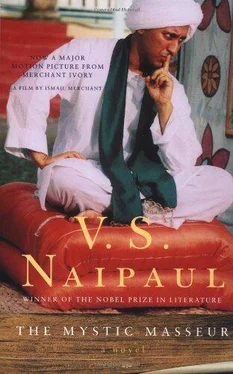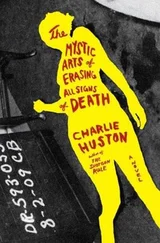‘It ain’t people teeth I want to pull out. But the boy doing all right, eh?’
‘For the time, yes. He done pay back for the machine. But Tunapuna is a busy place, remember. Eh, I see the time coming when quack go find it hard getting two cent to buy a bread and some cheap red butter.’
Suruj Mooma came in hot and dusty from the yard with a cocoye broom. ‘I was coming with a good good mind to sweep out the shop — eh! — and look at the first thing I hearing. Why for you must call the boy quack? It ain’t as if he not trying.’ She looked at Ganesh. ‘You know what wrong with Suruj Poopa? He just jealous the boy. He can’t even cut toenail, and a little boy pulling out big people teeth. Is just jealous he jealous the boy.’
Ganesh said, ‘You have something there, maharajin . Is like me and my massaging. I ain’t just rushing into it like that, you know. I learn and stop and study a lot about it, from my own father. It ain’t quack work.’
Beharry, on the defensive, nibbled. ‘Wasn’t that I did mean at all. I was just telling the pundit here that if he set hisself up as a massager in Fuente Grove he go have it hard.’
It didn’t take Ganesh long to find out that Beharry was right. There were too many masseurs in Trinidad, and it was useless to advertise. Leela told her friends, The Great Belcher told hers, Beharry promised to write to all the people he knew; but few cared to bring their ailments to a place as far away as Fuente Grove. The villagers themselves were very healthy.
‘Man,’ Leela said. ‘I don’t think you really make for massage.’
And the time came when he himself began to doubt his own powers. He could cure a nara , a simple stomach dislocation, as well as any masseur, and he could cure stiff joints. But he could never bring himself to risk bigger operations.
One day a young girl with a twisted arm came to see him. She looked happy enough but her mother was weeping and miserable. ‘We try everybody and everything, pundit. Nothing happen. And every day the girl getting older, but who go want to married she?’
She was a pretty girl, too, with lively eyes in an impassive face. She looked only at her mother, not once at Ganesh.
‘Twenty time people break over the girl hand, if they break it over one time,’ the mother continued. ‘But still the hand can’t set.’
He knew what his father would have done. He would have made the girl lie down, he would have placed his foot on her elbow, levered the arm upwards till it broke, then set it again. But all Ganesh said, after examining the hand, was, ‘It have nothing wrong with the girl, maharajin . She only have a little bad blood, that is all. And too besides, God make she that way and is not for me to interfere in God work.’
The girl’s mother stopped sobbing and pulled her pink veil over her head. ‘Is my fate,’ she said, without sadness.
The girl never spoke a word.
Afterwards Leela said, ‘Man, you shoulda at least try to fix the hand first, and then you coulda start talking about God work. But you don’t care what you doing to me. It look as though you only want to drive away people now.’
Ganesh continued to offend his patients by telling them that nothing was wrong with them; he spoke more and more about God’s work; and, if he was pressed, he gave out a mixture he had made from one of his father’s prescriptions, a green fluid made mostly from shining-bush and leaves of the neem tree.
He said, ‘Facts is facts, Leela. I ain’t have a hand for massage.’
There was another disappointment in his life. After a year it was clear that Leela couldn’t have children. He lost interest in her as a wife and stopped beating her. Leela took it well, but he expected no less of a good Hindu wife. She still looked after the house and in time became an efficient housekeeper. She cared for the garden at the back of the house and minded the cow. She never complained. Soon she was ruler in the house. She could order Ganesh about and he didn’t object. She gave him advice and he listened. He began to consult her on nearly everything. In time, though they would never had admitted it, they had grown to love each other. Sometimes, when he thought about it, Ganesh found it strange that the tall hard woman with whom he lived was the saucy girl who had once asked, ‘You could write too, sahib?’
And always there was Ramlogan to be mollified. The newspaper cutting with his photograph hung, mounted and framed, in his shop, above Leela’s notice concerning the provision of chairs for female shop assistants. Already the paper was going brown at the edges. Whenever Ganesh went, for one reason or another to Fourways, Ramlogan was sure to ask, ‘How the Institute going, man?’
‘Thinking about it all the time,’ Ganesh would say. Or, ‘Is all in my head, you know. Don’t rush me.’
Everything seemed to be going wrong and Ganesh feared that he had misread the signs of fate. It was only later that he saw the providential pattern of these disappointing months. ‘We never are what we want to be,’ he wrote, ‘but what we must be.’
He had failed as a masseur. Leela couldn’t have children. These disappointments, which might have permanently broken another man, turned Ganesh seriously, dedicatedly, to books. He had always intended to read and write, of course, but one wonders whether he would have done so with the same assiduity if he had been a successful masseur or the father of a large family.
‘Going to write a book,’ he told Leela. ‘Big book.’
There is a firm of American publishers called Street and Smith, versatile, energetic people who had pushed their publications as far as South Trinidad. Ganesh was deeply impressed by Street and Smith, had been since he was a boy; and, without saying a word to Beharry or Leela, he sat down one evening at the little table in the drawing room, turned up the oil lamp, and wrote a letter to Street and Smith. He told them that he was thinking of writing books and wondered whether either of them was interested.
The reply came within a month. Street and Smith said they were very interested.
‘You must tell Pa,’ Leela said.
Beharry said, ‘The Americans is nice people. You must write this book for them.’
Ganesh framed the Street and Smith letter in passe-partout and hung it on the wall above the table where he had written his letter.
‘Is only the beginning,’ he told Leela.
Ramlogan came all the way from Fourways and when he gazed on the framed letter his eyes filled with tears. ‘Sahib, this is something else for the papers. Yes, man, sahib, write the books for them.’
‘Is just what Beharry, Fuente Grove so-call shopkeeper, tell him,’ Leela said.
‘Never mind.’ Ramlogan said. ‘I still think he should write the books. But I bet it make you feel proud, eh, sahib, having the Americans begging you to write a book for them?’
‘Nah,’ Ganesh said quickly. ‘You wrong there. It don’t make me feel proud at all at all. You know how it make me feel? It make me feel humble, if I tell the truth. Humble humble.’
‘Is the sign of a great man, sahib.’
The actual writing of the book worried Ganesh and he kept putting it off. When Leela asked, ‘Man, why you ain’t writing the book the American people begging you to write?’ Ganesh replied, ‘Leela, is talk like that that does break up a man science of thought. You mean you can’t see that I thinking, thinking about it all all the time?’
He never wrote the book for Street and Smith.
‘I didn’t promise anything,’ he said. ‘And don’t think I waste my time.’
Street and Smith had made him think about the art of writing. Like many Trinidadians Ganesh could write correct English but it embarrassed him to talk anything but dialect except on very formal occasions. So while, with the encouragement of Street and Smith, he perfected his prose to a Victorian weightiness he continued to talk Trinidadian, much against his will.
Читать дальше












